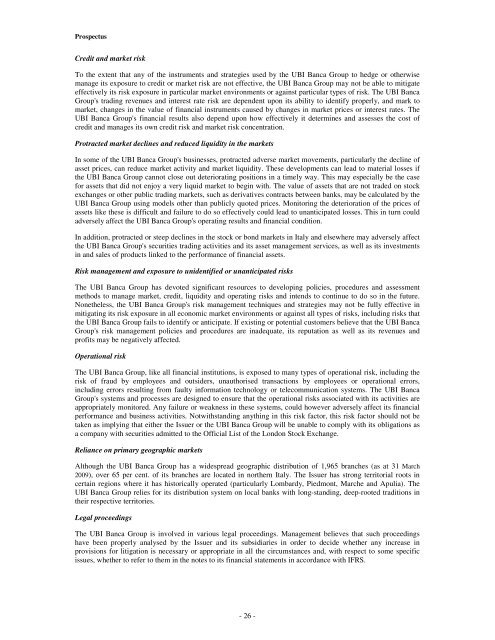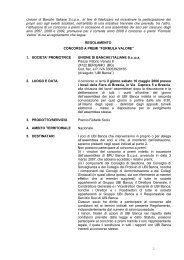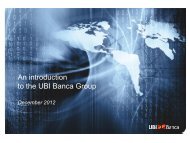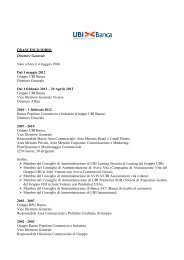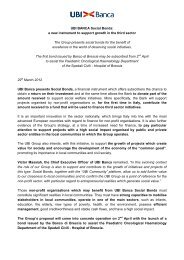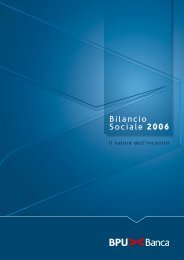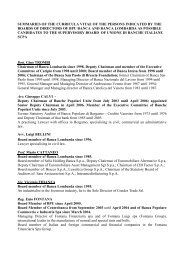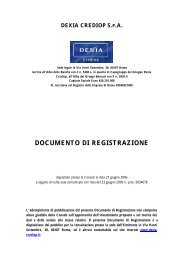Prospectus UBI Banca Covered Bond Programme
Prospectus UBI Banca Covered Bond Programme
Prospectus UBI Banca Covered Bond Programme
You also want an ePaper? Increase the reach of your titles
YUMPU automatically turns print PDFs into web optimized ePapers that Google loves.
<strong>Prospectus</strong><br />
Credit and market risk<br />
To the extent that any of the instruments and strategies used by the <strong>UBI</strong> <strong>Banca</strong> Group to hedge or otherwise<br />
manage its exposure to credit or market risk are not effective, the <strong>UBI</strong> <strong>Banca</strong> Group may not be able to mitigate<br />
effectively its risk exposure in particular market environments or against particular types of risk. The <strong>UBI</strong> <strong>Banca</strong><br />
Group's trading revenues and interest rate risk are dependent upon its ability to identify properly, and mark to<br />
market, changes in the value of financial instruments caused by changes in market prices or interest rates. The<br />
<strong>UBI</strong> <strong>Banca</strong> Group's financial results also depend upon how effectively it determines and assesses the cost of<br />
credit and manages its own credit risk and market risk concentration.<br />
Protracted market declines and reduced liquidity in the markets<br />
In some of the <strong>UBI</strong> <strong>Banca</strong> Group's businesses, protracted adverse market movements, particularly the decline of<br />
asset prices, can reduce market activity and market liquidity. These developments can lead to material losses if<br />
the <strong>UBI</strong> <strong>Banca</strong> Group cannot close out deteriorating positions in a timely way. This may especially be the case<br />
for assets that did not enjoy a very liquid market to begin with. The value of assets that are not traded on stock<br />
exchanges or other public trading markets, such as derivatives contracts between banks, may be calculated by the<br />
<strong>UBI</strong> <strong>Banca</strong> Group using models other than publicly quoted prices. Monitoring the deterioration of the prices of<br />
assets like these is difficult and failure to do so effectively could lead to unanticipated losses. This in turn could<br />
adversely affect the <strong>UBI</strong> <strong>Banca</strong> Group's operating results and financial condition.<br />
In addition, protracted or steep declines in the stock or bond markets in Italy and elsewhere may adversely affect<br />
the <strong>UBI</strong> <strong>Banca</strong> Group's securities trading activities and its asset management services, as well as its investments<br />
in and sales of products linked to the performance of financial assets.<br />
Risk management and exposure to unidentified or unanticipated risks<br />
The <strong>UBI</strong> <strong>Banca</strong> Group has devoted significant resources to developing policies, procedures and assessment<br />
methods to manage market, credit, liquidity and operating risks and intends to continue to do so in the future.<br />
Nonetheless, the <strong>UBI</strong> <strong>Banca</strong> Group's risk management techniques and strategies may not be fully effective in<br />
mitigating its risk exposure in all economic market environments or against all types of risks, including risks that<br />
the <strong>UBI</strong> <strong>Banca</strong> Group fails to identify or anticipate. If existing or potential customers believe that the <strong>UBI</strong> <strong>Banca</strong><br />
Group's risk management policies and procedures are inadequate, its reputation as well as its revenues and<br />
profits may be negatively affected.<br />
Operational risk<br />
The <strong>UBI</strong> <strong>Banca</strong> Group, like all financial institutions, is exposed to many types of operational risk, including the<br />
risk of fraud by employees and outsiders, unauthorised transactions by employees or operational errors,<br />
including errors resulting from faulty information technology or telecommunication systems. The <strong>UBI</strong> <strong>Banca</strong><br />
Group's systems and processes are designed to ensure that the operational risks associated with its activities are<br />
appropriately monitored. Any failure or weakness in these systems, could however adversely affect its financial<br />
performance and business activities. Notwithstanding anything in this risk factor, this risk factor should not be<br />
taken as implying that either the Issuer or the <strong>UBI</strong> <strong>Banca</strong> Group will be unable to comply with its obligations as<br />
a company with securities admitted to the Official List of the London Stock Exchange.<br />
Reliance on primary geographic markets<br />
Although the <strong>UBI</strong> <strong>Banca</strong> Group has a widespread geographic distribution of 1,965 branches (as at 31 March<br />
2009), over 65 per cent. of its branches are located in northern Italy. The Issuer has strong territorial roots in<br />
certain regions where it has historically operated (particularly Lombardy, Piedmont, Marche and Apulia). The<br />
<strong>UBI</strong> <strong>Banca</strong> Group relies for its distribution system on local banks with long-standing, deep-rooted traditions in<br />
their respective territories.<br />
Legal proceedings<br />
The <strong>UBI</strong> <strong>Banca</strong> Group is involved in various legal proceedings. Management believes that such proceedings<br />
have been properly analysed by the Issuer and its subsidiaries in order to decide whether any increase in<br />
provisions for litigation is necessary or appropriate in all the circumstances and, with respect to some specific<br />
issues, whether to refer to them in the notes to its financial statements in accordance with IFRS.<br />
- 26 -


